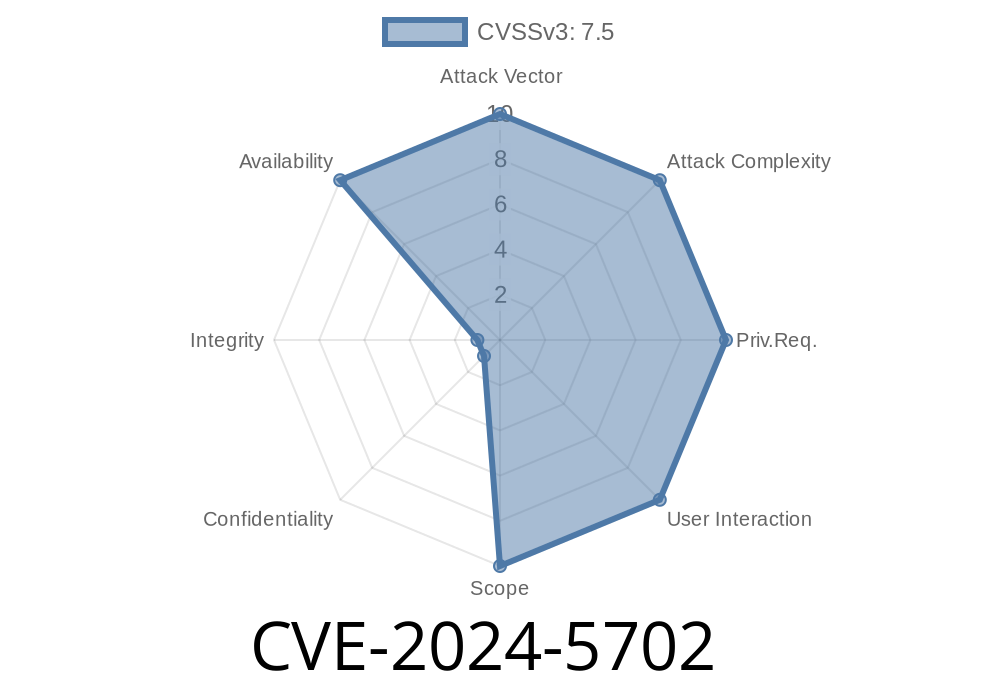---
In June 2024, Mozilla addressed a critical security issue identified as CVE-2024-5702. This vulnerability involved memory corruption in the networking stack of Firefox, Firefox ESR, and Thunderbird email client—opening the door to potentially serious exploits if left unpatched. Let’s break down what happened, how attackers could use this bug, and what it means for end-users and organizations.
What is CVE-2024-5702?
At its core, CVE-2024-5702 is a bug that could cause a crash (and possibly arbitrary code execution) by corrupting memory during network operations. It affected:
Thunderbird versions before 115.12
The bug was considered of high severity because memory corruption can be tricky: attackers can trigger a crash, but in some cases, they can take control of the process, running their code with the same privileges as the user.
Where Did the Bug Live?
The vulnerability was found in the networking stack—the part of the browser that handles web requests and network responses, including complex protocols and parsing lots of untrusted data.
While Mozilla’s security advisory provides few technical details (to protect users until everyone has applied updates), clues from Mozilla’s bug tracker and patch notes indicate the bug involved improper handling of memory during network events, like receiving malformed HTTP responses.
How Could an Attack Work?
Attackers could try to exploit this flaw by tricking a user into visiting a specially crafted malicious website or opening a harmful email in Thunderbird. The site (or email) would send data that’s designed to trigger the memory corruption bug.
Victim visits the attacker's website (or opens a bad email in Thunderbird).
3. The browser's networking code mishandles the data, corrupts memory, and—depending on the attacker’s skill—either crashes or starts executing injected code.
4. If code execution is achieved, malware can be installed, passwords stolen, or further attacks launched.
Sample Proof-of-Concept Code
Here’s an overly simplified illustration of how such a bug might be triggered (for educational purposes).
Suppose there’s a C++ function inside Firefox that handles network packets
// Hypothetical buggy function
void handle_network_data(char* data, unsigned int length) {
char buffer[256];
// No bounds checking!
memcpy(buffer, data, length);
}
If length is larger than 256, this code overwrites the stack, corrupting memory. Attackers can craft network responses that purposely send overlong data fields, leveraging this flaw.
*Note: The actual bug may involve subtler code, but this snippet captures the type of oversight.*
Real-World Impact
- Exploitability: While exploiting memory corruption can require skill, history has shown determined attackers can turn these bugs into working malware delivery mechanisms (especially in browsers).
- Users at risk: Anyone using vulnerable versions, especially those visiting suspect sites or opening unpredictable content, was at risk.
- Patches issued: Mozilla released fixes in Firefox 125, Firefox ESR 115.12, and Thunderbird 115.12.
What Should You Do?
1. Upgrade immediately: Make sure you’re running at least Firefox 125, ESR 115.12, or Thunderbird 115.12.
Mozilla Security Advisory:
MFSA 2024-23: Memory corruption in Networking stack
NVD Entry:
Bugzilla Entry:
In Summary
CVE-2024-5702 reminds us that even modern, well-maintained software like Firefox can include critical flaws. When browsers and email clients are involved, patching is urgent, because attackers love these bugs. If you or your users still use vulnerable versions—patch now and stay protected.
Feel free to share or quote this post, but always cite the original advisories for the latest trusted info!
Timeline
Published on: 06/11/2024 13:15:51 UTC
Last modified on: 08/12/2024 17:35:14 UTC
